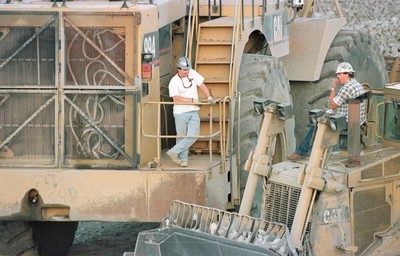White Pine County restored to fiscal health
As Wall Street wobbles and the state budget withers, it seems as if you have to go all the way to Ely to find some promising financial news.
Three years ago, rural White Pine County made Nevada history by declaring a severe financial emergency and handing control of its budget to the Nevada Department of Taxation. Now state officials are planning their exit from the county seat of Ely, where coffers are full once again thanks in no small part to the Silver State's latest mining boom.
The rural county has gone from monthly battles with negative fund balances to a cash reserve of $4 million to help it ride out a sudden decline in revenue.
The target date for the county to resume control of its finances is July 1, almost four years to the day that the Department of Taxation took over.
"I think we're ready," said White Pine County Commissioner Gary Lane.
The county just hired a new finance director who is slated to start work today, and last week the commissioners created an exit committee to oversee the transition.
"I don't want to see them go away until we are on (as) solid financial ground as we can be," said former Commissioner Brent Eldridge, who left office at the end of August. "I think we're there."
So does Terry Rubald, chief of the Department of Taxation's division of assessment standards.
With its reserve fund, new accounting policies and spending controls, White Pine County is in far better shape than it was, Rubald said.
Simply put, state intervention "prevented insolvency," she said.
The first thing state and county officials did was clamp down on expenses, Rubald said. "We had very tight budgets."
To quickly build a reserve fund, they levied temporary taxes on sales, hotel rooms and government services in the county. Those taxes have since been lifted.
The county's financial recovery plan was helped to a large extent by actual financial recovery there.
"It just kind of turned around all by itself," Eldridge said. "The local economy is what really turned it around."
And when he talks about the local economy, what Eldridge really means is "the mine and the spin from the mine."
"The mining business really is the root cause of our ups and downs," he said.
Right now, for example, business is booming at the open-pit copper mine five miles west of Ely. When the county's revenues suddenly cratered in 2004, the mine was just coming back to life after a closure.
To truly insulate itself from the boom-and-bust cycle, White Pine County needs more than a rainy day fund, Lane said. It needs other industries, other employers, and other sources of tax revenue.
At the moment, he said, the best hope for that seems to rest with a pair of coal-fired power plants proposed in the area.
The projects have stirred concerns about air quality and drawn opposition from no less than Senate Majority Leader Harry Reid, D-Nev., but Lane said the commission considers them crucial to the county's economic future.
"That way, no matter what happens with the mining, we'll be stable," he said.
It was a mining downturn, and the county's failure to react to it, that led to the financial emergency.
Eldridge refused to point the finger at anyone specifically, but he acknowledged that county officials "lost track of things" in the months leading up to state intervention.
At one point during the fiscal year that ended June 30, 2005, the county exceeded its $7.6 million general fund budget by more than $1 million.
A last-ditch effort was made to stop the bleeding before the emergency was declared, but after layoffs and other cuts totaling more than $1.2 million the county still found itself roughly $250,000 in the red.
When the State Tax Commission voted unanimously to declare a severe financial emergency, it marked the first time such an action had been taken on behalf of a Nevada county.
The situation has improved since then, but White Pine County isn't immune from the larger economic troubles now afflicting Nevada and the nation. The county's unemployment rate has ticked up to 4.5 percent, its highest level since 2001, while taxable sales have declined by about 1.7 percent since June 2007, ending a streak of steep growth dating back several years.
And local officials recently learned that the Railroad Depot Museum, one of Ely's more popular attractions, may be closed next year by state budget cuts.
Peter Barton, acting administrator for the State Division of Museums and History, said the depot is slated to close July 1 and remain shuttered for "the duration of the economic crisis."
Lane said the move cuts "right to the heart of tourism" in Ely. The commission voted last week to send a letter protesting the closure to the governor and others.
"It's horrible. We're totally against it," he said. "Why pick on us? We're just struggling to survive over here."
Barton said the depot museum and nearby freight barn has a two-person staff and costs the state $600,000 a year.
The state just wrapped up $1.4 million worth of renovations at the depot, which offers seasonal train rides along the tracks that used to serve mines in the area.
Those rides are not run by the state and are expected to continue, though the ticket booth inside the depot may have to relocate.
Contact reporter Henry Brean at hbrean @reviewjournal.com or 702-383-0350.


















